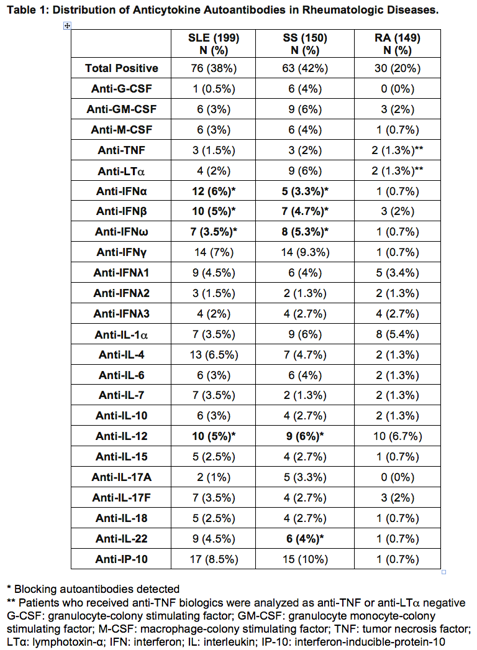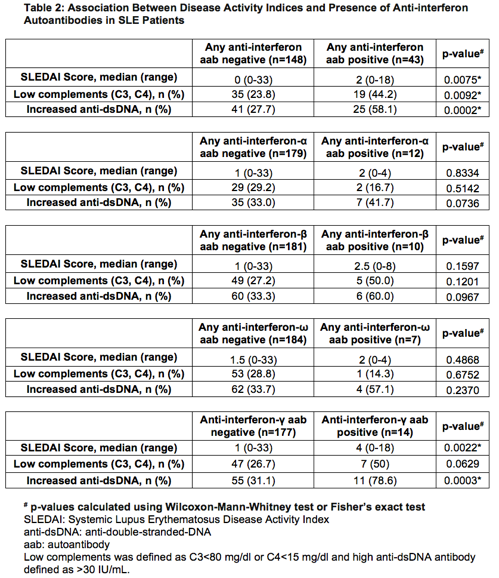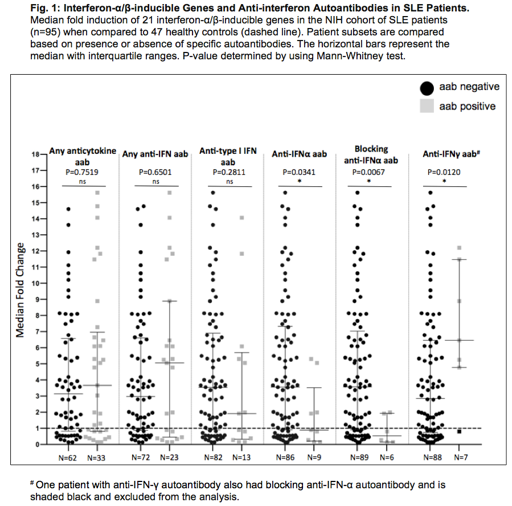Session Information
Date: Monday, November 9, 2015
Title: Systemic Lupus Erythematosus - Human Etiology and Pathogenesis Poster II
Session Type: ACR Poster Session B
Session Time: 9:00AM-11:00AM
Background/Purpose:
Anticytokine autoantibodies are pathogenic in many hematologic, pulmonary
and infectious diseases. However, a systematic investigation of their presence and
significance in autoimmune diseases is lacking.
Methods:
Serum samples from patients with systemic lupus erythematosus
(SLE) (n=199), primary Sjšgren’s syndrome (SS) (n=150) and rheumatoid arthritis (RA)
(n=149) were compared to healthy controls (n=200) for autoantibodies against 24
cytokines using a multiplex bead-based assay. All patients fulfilled ACR
classification criteria for their respective diseases.
Any anticytokine autoantibody concentration above two standard deviations of the
mean of healthy controls for the same target was classified as positive. Biological
activity was evaluated by the ability of sera to block cytokine-induced signal
transduction or protein expression. RNA sequencing was performed on whole blood in a subset of controls and SLE
patients.
Results:
SLE and SS patients had a disproportionate presence of
autoantibodies against interferons (IFNs) as well as the IFN-responsive
chemokine IFN-inducible-protein-10 (IP-10) (Table. 1). Autoantibodies against
type I IFN, IL-12 and IL-22 were neutralizing. In SLE, anti-IFN-γ autoantibodies tracked with increased disease
activity, anti-double-stranded-DNA antibodies, and elevated expression of IFN-α/β-inducible genes (Table 2 and Figure 1). Conversely, SLE patients
with blocking anti-IFN-α autoantibodies normalized their type I IFN gene
signature. Autoantibodies were observed against macrophage-colony stimulating
factor, IL-4, IL-7, IL-17 and IL-22, which had not been previously identified
in the context of rheumatologic disease. Novel anti-type III IFN (λ2, λ3)
and anti-IP-10 autoantibodies were detected.
Conclusion:
Anticytokine autoantibodies are a common feature of
autoimmune diseases and extend to more cytokines than previously appreciated. Patterns of anticytokine
autoantibodies appeared to be specific to each disease. In particular, anti-IFN
autoantibodies were overrepresented in SLE and SS. Autoantibodies
against type I and type II IFNs in SLE are biologically active and appear to
have distinct functional roles, suggesting a contribution to disease
pathogenesis that may alter both expression and the course of clinical disease.
To cite this abstract in AMA style:
Gupta S, Tatouli IP, Rosen LB, Hasni S, Alevizos I, Manna ZG, Rivera J, Jiang C, Siegel RM, Holland SM, Moutsopoulos HM, Browne SK. Anti-Interferon Autoantibodies in Systemic Lupus Erythematosus Are Biologically Active and Have Distinct Functions [abstract]. Arthritis Rheumatol. 2015; 67 (suppl 10). https://acrabstracts.org/abstract/anti-interferon-autoantibodies-in-systemic-lupus-erythematosus-are-biologically-active-and-have-distinct-functions/. Accessed .« Back to 2015 ACR/ARHP Annual Meeting
ACR Meeting Abstracts - https://acrabstracts.org/abstract/anti-interferon-autoantibodies-in-systemic-lupus-erythematosus-are-biologically-active-and-have-distinct-functions/



